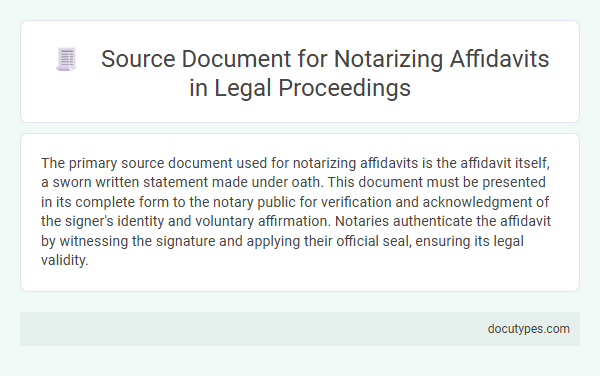The primary source document used for notarizing affidavits is the affidavit itself, a sworn written statement made under oath. This document must be presented in its complete form to the notary public for verification and acknowledgment of the signer's identity and voluntary affirmation. Notaries authenticate the affidavit by witnessing the signature and applying their official seal, ensuring its legal validity.
Introduction to Notarizing Affidavits in Legal Proceedings
| Introduction to Notarizing Affidavits in Legal Proceedings | |
|---|---|
| Definition of Affidavit | An affidavit is a written statement confirmed by oath or affirmation, used as evidence in court. It must be sworn before a licensed notary public. |
| Purpose of Notarization | Notarization authenticates the affidavit, verifying the identity of the affiant and ensuring the document is signed willingly and under oath. |
| Key Source Document | Your source document for notarizing affidavits is the affidavit itself, which must be presented in its original form for verification by the notary. |
| Notary's Role | The notary public confirms the affiant's identity, witnesses the signing, administers the oath, and records the notarization details on the affidavit or notary journal. |
| Legal Requirements | Jurisdictional laws dictate specific notarization procedures, including notarization certificates, seals, and record-keeping, to ensure validity in legal proceedings. |
Definition and Importance of Source Documents
A source document for notarizing affidavits is the original paperwork or evidence that supports the statements made in the affidavit. It typically includes identification documents, contracts, or any relevant official records that verify the information provided.
Source documents play a crucial role in ensuring the authenticity and accuracy of notarized affidavits. You must present these documents to the notary public to confirm the legitimacy of your affidavit and to protect against fraud.
Common Types of Source Documents for Affidavits
Source documents used for notarizing affidavits typically include government-issued identification, such as a passport or driver's license, to verify the identity of the affiant. Common types of source documents also encompass supporting evidence like contracts, property deeds, or financial statements relevant to the affidavit's purpose. You must present these original or certified copies to ensure the accuracy and legality of the notarization process.
Legal Requirements for Valid Source Documents
What source document is required for notarizing affidavits? The source document must be an original, valid identification issued by a recognized authority, such as a government-issued photo ID. Legal requirements ensure the document verifies the signer's identity to uphold the affidavit's authenticity and prevent fraud.
Authentication and Verification Processes
The primary source document used for notarizing affidavits is the affidavit itself, which must be a written statement sworn or affirmed before a notary public. This document includes your personal information, facts under oath, and the affiant's signature, serving as proof of authenticity during legal proceedings.
The authentication process requires the notary public to verify the affiant's identity using government-issued identification. Verification ensures the affiant willingly signs the affidavit, completing a legally binding process that supports its credibility in court or official matters.
Role of Notaries in Affidavit Documentation
Source documents are essential for notarizing affidavits, providing the necessary proof of identity and authenticity. Notaries play a critical role in verifying these documents to ensure the affidavit is legally valid.
- Identification Documents - Government-issued IDs like driver's licenses or passports verify the signer's identity.
- Affidavit Text - The written affidavit outlines the sworn statement requiring notarization.
- Notary Journal - The notary records details of the notarization to maintain a legal record.
Your role involves presenting valid source documents to the notary for accurate and lawful affidavit notarization.
Best Practices for Handling Source Documents
The primary source document used for notarizing affidavits is the affidavit itself, which must be complete and accurate. Best practices for handling these source documents include verifying the identity of the signer, ensuring the document is signed in the notary's presence, and maintaining a secure record of the notarization. You should always keep the original affidavit and any related identification documents properly stored to protect authenticity and legal validity.
Common Challenges in Procuring Source Documents
Source documents used for notarizing affidavits typically include government-issued IDs such as passports or driver's licenses. Procuring these documents can present various challenges that affect the notarization process.
- Verification Delays - Delays often occur due to the time required to confirm the authenticity of IDs with issuing authorities.
- Document Expiry - Expired identification documents are frequently rejected, causing obstacles in notarizing affidavits.
- Accessibility Issues - Obtaining valid source documents can be difficult for individuals without easy access to government offices or digital verification systems.
Legal Consequences of Improper Documentation
The primary source document used for notarizing affidavits is the affidavit itself, which must be a sworn written statement verified by the affiant. This document serves as the foundation for the notary to authenticate the identity of the signer and witness the signing process.
Improper documentation during notarization can lead to significant legal consequences, including the affidavit being declared invalid or inadmissible in court. Notaries who fail to adhere to proper procedures risk civil liability, disciplinary action, and potential criminal charges. Ensuring the accuracy and completeness of the source document is essential for maintaining the affidavit's legal integrity and enforceability.
What Source Document Is Used for Notarizing Affidavits? Infographic

